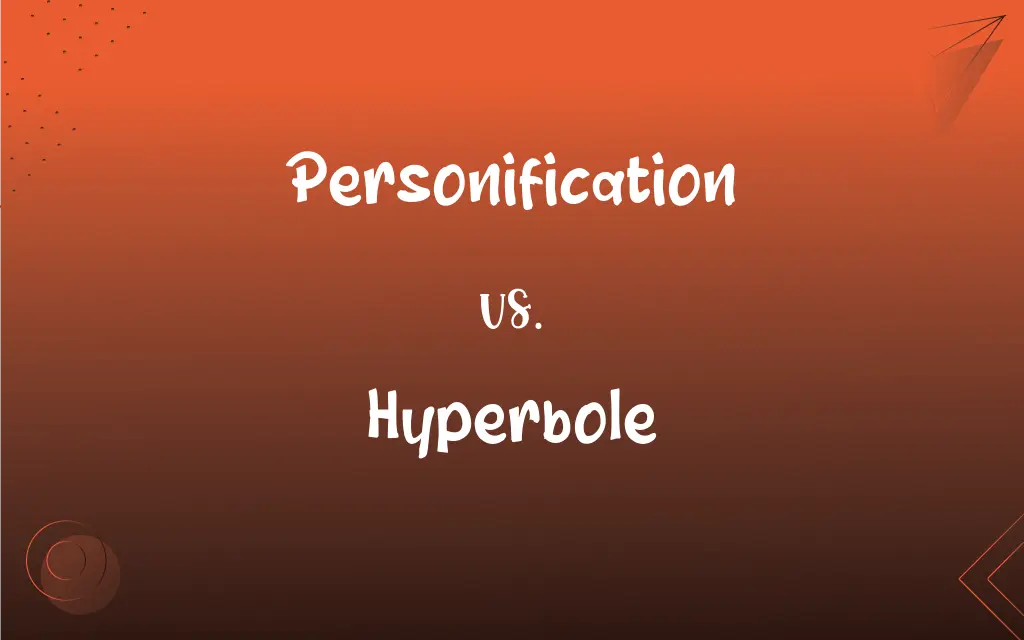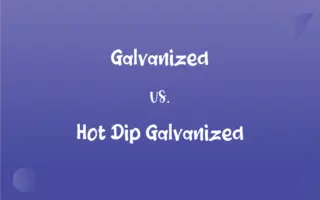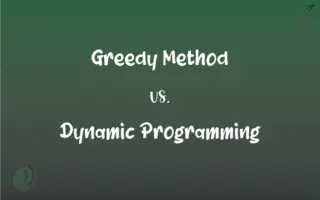Personification vs. Hyperbole: What's the Difference?
Edited by Aimie Carlson || By Harlon Moss || Published on February 23, 2024
Personification is attributing human characteristics to non-human entities, while hyperbole is an exaggerated statement not meant to be taken literally.

Key Differences
Personification involves giving human traits, emotions, or actions to inanimate objects, animals, or abstract concepts, making them relatable or vivid in literature. Hyperbole, in contrast, is a rhetorical device that uses extreme exaggeration to emphasize a point, often for humor or dramatic effect.
In personification, objects or ideas perform actions or exhibit emotions usually associated with humans, like a talking animal or a weeping sky. Hyperbole magnifies a concept to an absurd level, such as saying "I'm so hungry I could eat a horse," not to be taken literally but to stress the extent of hunger.
Personification is often used to create imagery and add depth to writing, making non-human elements seem alive and personal. Hyperbole, while also enriching text, primarily serves to intensify feelings or impressions far beyond their actual scale.
Personification breathes life into the non-living or abstract, making them characters in their own right, while hyperbole stretches the truth, enlarging realities to unrealistic proportions to make a memorable point.
Both personification and hyperbole are common in poetry and prose. Personification often adds a lyrical, emotional quality, whereas hyperbole injects drama or humor through its stark exaggeration.
ADVERTISEMENT
Comparison Chart
Primary Function
Attributing human qualities to non-humans
Exaggerating for emphasis or effect
Usage
To make inanimate objects or concepts relatable
To intensify or dramatize a statement
Literary Effect
Adds depth, emotion, and imagery
Creates humor, drama, or strong impact
Nature of Expression
Human-like traits in non-humans
Overstated or extreme descriptions
Purpose in Text
Enhances narrative and descriptive writing
Emphasizes feelings or situations
ADVERTISEMENT
Personification and Hyperbole Definitions
Personification
Attribution of human characteristics to non-human entities.
The wind whispered through the trees.
Hyperbole
Overstatement for dramatic or comic effect.
This bag weighs a ton.
Personification
Giving human traits to animals or inanimate objects.
The clock danced away the moments.
Hyperbole
Using extreme exaggeration in speech or writing.
He's as old as the hills.
Personification
Representing an abstract quality or idea as a person.
Death stood at the door.
Hyperbole
An exaggerated statement not meant to be taken literally.
I've told you a million times.
Personification
Making non-human things act like humans in narrative.
The sun smiled down on the field.
Hyperbole
Exaggerating to emphasize a point.
I'm so hungry I could eat a horse.
Personification
Using human emotions or actions for non-humans.
The car groaned as it climbed the steep hill.
Hyperbole
Deliberately magnified claims to create impact.
Her smile was a mile wide.
Personification
The act of personifying.
Hyperbole
A figure of speech in which exaggeration is used for emphasis or effect, as in I could sleep for a year or This book weighs a ton.
Personification
A person or thing typifying a certain quality or idea; an embodiment or exemplification
"He's invisible, a walking personification of the Negative" (Ralph Ellison).
Hyperbole
Deliberate or unintentional overstatement, particularly extreme overstatement.
Hyperbole
(countable) An instance or example of such overstatement.
Hyperbole
A hyperbola.
Hyperbole
A figure of speech in which the expression is an evident exaggeration of the meaning intended to be conveyed, or by which things are represented as much greater or less, better or worse, than they really are; a statement exaggerated fancifully, through excitement, or for effect.
Our common forms of compliment are almost all of them extravagant hyperboles.
Somebody has said of the boldest figure in rhetoric, the hyperbole, that it lies without deceiving.
Hyperbole
Extravagant exaggeration
FAQs
What is personification?
It's attributing human qualities to non-human things.
Does personification involve emotions?
Yes, it often attributes human emotions to non-humans.
Are there rules for personification?
It's flexible, but should align with human traits.
Is hyperbole easy to identify?
Usually, due to its obvious exaggeration.
Can hyperbole be realistic?
No, it's intentionally unrealistic and exaggerated.
Is hyperbole always humorous?
Not always, but it's often used for humor or drama.
Is personification common in poetry?
Very common, due to its imagery-enhancing quality.
What's hyperbole?
It's using exaggerated statements for emphasis.
Can personification be used in all genres?
Yes, it's versatile across literary genres.
Does hyperbole use comparison?
Not directly, it's more about extreme amplification.
Can personification help in visualization?
Yes, it vividly brings non-human elements to life.
Is personification a form of metaphor?
Yes, it's a specific type of metaphor.
Do all cultures use hyperbole?
Yes, it's a universal rhetorical device.
Should hyperbole be believable?
No, believability isn't its goal.
Can hyperbole be negative?
Yes, it can exaggerate negatives for effect.
Can personification be subtle?
Yes, it can range from obvious to subtle.
Is personification used in everyday language?
Yes, often in a less formal context.
Does personification require creativity?
Yes, it demands imaginative thinking.
Is hyperbole suitable for formal writing?
Typically, it's more suited to creative writing.
Can hyperbole be a literary tool?
Absolutely, it's widely used in literature.
About Author
Written by
Harlon MossHarlon is a seasoned quality moderator and accomplished content writer for Difference Wiki. An alumnus of the prestigious University of California, he earned his degree in Computer Science. Leveraging his academic background, Harlon brings a meticulous and informed perspective to his work, ensuring content accuracy and excellence.
Edited by
Aimie CarlsonAimie Carlson, holding a master's degree in English literature, is a fervent English language enthusiast. She lends her writing talents to Difference Wiki, a prominent website that specializes in comparisons, offering readers insightful analyses that both captivate and inform.






































































